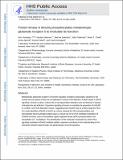| dc.contributor.author | Uematsu, Ken | |
| dc.contributor.author | Heiman, Myriam | |
| dc.contributor.author | Zelenina, Marina | |
| dc.contributor.author | Padovan, Julio | |
| dc.contributor.author | Chait, Brian T. | |
| dc.contributor.author | Aperia, Anita | |
| dc.contributor.author | Nishi, Akinori | |
| dc.contributor.author | Greengard, Paul | |
| dc.date.accessioned | 2016-05-09T17:37:06Z | |
| dc.date.available | 2016-05-09T17:37:06Z | |
| dc.date.issued | 2015-03 | |
| dc.date.submitted | 2014-12 | |
| dc.identifier.issn | 00223042 | |
| dc.identifier.issn | 1471-4159 | |
| dc.identifier.uri | http://hdl.handle.net/1721.1/102444 | |
| dc.description.abstract | Metabotropic glutamate receptor 5 (mGluR5) regulates excitatory post-synaptic signaling in the central nervous system (CNS) and is implicated in various CNS disorders. Protein kinase A (PKA) signaling is known to play a critical role in neuropsychiatric disorders such as Parkinson's disease, schizophrenia, and addiction. Dopamine signaling is known to modulate the properties of mGluR5 in a cAMP- and PKA-dependent manner, suggesting that mGluR5 may be a direct target for PKA. Our study identifies mGluR5 at Ser870 as a direct substrate for PKA phosphorylation and demonstrates that this phosphorylation plays a critical role in the PKA-mediated modulation of mGluR5 functions such as extracellular signal-regulated kinase phosphorylation and intracellular Ca[superscript 2+] oscillations. The identification of the molecular mechanism by which PKA signaling modulates mGluR5-mediated cellular responses contributes to the understanding of the interaction between dopaminergic and glutamatergic neuronal signaling.
We identified serine residue 870 (S870) in metabotropic glutamate receptor 5 (mGluR5) as a direct substrate for protein kinase A (PKA). The phosphorylation of this site regulates the ability of mGluR5 to induce extracellular signal-regulated kinase (ERK) phosphorylation and intracellular Ca[superscript 2+] oscillations. This study provides a direct molecular mechanism by which PKA signaling interacts with glutamate neurotransmission. | en_US |
| dc.language.iso | en_US | |
| dc.publisher | Wiley Blackwell | en_US |
| dc.relation.isversionof | http://dx.doi.org/10.1111/jnc.13038 | en_US |
| dc.rights | Creative Commons Attribution-Noncommercial-Share Alike | en_US |
| dc.rights.uri | http://creativecommons.org/licenses/by-nc-sa/4.0/ | en_US |
| dc.source | PMC | en_US |
| dc.title | Protein kinase A directly phosphorylates metabotropic glutamate receptor 5 to modulate its function | en_US |
| dc.type | Article | en_US |
| dc.identifier.citation | Uematsu, Ken, Myriam Heiman, Marina Zelenina, Julio Padovan, Brian T. Chait, Anita Aperia, Akinori Nishi, and Paul Greengard. “Protein Kinase A Directly Phosphorylates Metabotropic Glutamate Receptor 5 to Modulate Its Function.” Journal of Neurochemistry 132, no. 6 (March 2015): 677–686. | en_US |
| dc.contributor.department | Massachusetts Institute of Technology. Department of Brain and Cognitive Sciences | en_US |
| dc.contributor.department | Picower Institute for Learning and Memory | en_US |
| dc.contributor.mitauthor | Heiman, Myriam | en_US |
| dc.relation.journal | Journal of Neurochemistry | en_US |
| dc.eprint.version | Author's final manuscript | en_US |
| dc.type.uri | http://purl.org/eprint/type/JournalArticle | en_US |
| eprint.status | http://purl.org/eprint/status/PeerReviewed | en_US |
| dspace.orderedauthors | Uematsu, Ken; Heiman, Myriam; Zelenina, Marina; Padovan, Julio; Chait, Brian T.; Aperia, Anita; Nishi, Akinori; Greengard, Paul | en_US |
| dc.identifier.orcid | https://orcid.org/0000-0002-6365-8673 | |
| mit.license | OPEN_ACCESS_POLICY | en_US |
